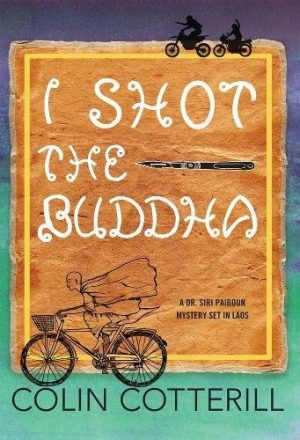 Written by Colin Cotterill — Dr Siri Paiboun is a recently retired coroner in 1970s Laos. He lives with his wife Madame Daeng, the proprietress of the local noodle shop, and we’ve met them before in Six and a Half Deadly Sins and The Woman Who Wouldn’t Die. Not much happens in their hometown of Vientiane these days. The glory days of the revolution are long gone, leaving only disappointment with the corrupt realities of Communist rule, and the deprivations and boredom that go with it.
Written by Colin Cotterill — Dr Siri Paiboun is a recently retired coroner in 1970s Laos. He lives with his wife Madame Daeng, the proprietress of the local noodle shop, and we’ve met them before in Six and a Half Deadly Sins and The Woman Who Wouldn’t Die. Not much happens in their hometown of Vientiane these days. The glory days of the revolution are long gone, leaving only disappointment with the corrupt realities of Communist rule, and the deprivations and boredom that go with it.
However, in his capacity as the only coroner in all of Laos, Siri is sometimes called on by the government to serve. In the meantime, a mystery always seems to present itself to be solved.
Siri and Daeng, albeit stiff-jointed septuagenarians, are former revolutionaries who can never resist an adventure. As the book opens, the disillusioned but kind-hearted couple are as usual busy harbouring local misfits and steering clear of Party meetings and directives. Then one of their own, an eccentric monk, mysteriously vanishes.
Before disappearing across the Mekong River into Thailand, the monk leaves a cryptic note about a fellow brother wrongfully accused of a triple-murder. By hook or by crook the elderly team follow him across the border to rescue him and solve the murders. Meanwhile, the policeman Phosy must investigate the killings in formal fashion. He believes the railroaded monk is being accused by the authorities as an act of repression. Meanwhile, Civilai, an aged former Politburo member and old comrade of Siri’s must embark on a journey to a remote village to investigate a claim of the Buddha reincarnated. Along the way, all three investigations one way or another come up against the Communist regime’s prohibition of Buddhism and animistic belief systems.
New readers of the Siri Paiboun series, here reaching its 11th title, may be surprised by the supernatural aspects and otherworldly characters that inhabit Siri’s world, which is always infused with playful humour throughout. Even Cotterill himself includes a wry disclaimer in the beginning to warn new readers of his supernatural aesthetic. The body of Siri himself is inhabited by an ancient monk named Yeh Ming who often casts visions for Siri, but he and the other spirits who visit Siri are not much help in solving the mystery du jour. Cotterill moves the story along some convoluted turns, with chapter titles that all play on Western cultural phrases or song titles.
Eventually the threads converge in Cotterill’s typical madcap and entertaining style. Siri must battle netherworld demons with the help of village locals while Civilai must survive a confrontation with a satanic cult controlling a remote rural enclave. Newcomers will have a hard time sorting out the characters as the plot unfolds, which itself is overly complicated. Although ultimately rewarded for hanging tough to the end, fans of the series will notice some favourite characters like nurse Dtui and her assistant Geung have smaller parts.
Although the Siri Paiboun series edged into quite dark territory in recent years, this latest issue is more in the spirit of the earlier books, with dry humour and fun villains to mock the absurdity of Communist rule without being frivolous about the horrors of the regime. Cotterill provides rich insight into Lao culture and history, and in this case, even some Thai diplomacy. I Shot the Buddha belongs in any Third World noir collection, sub-section: humour. The Kindle price is unusually high.
Soho Press
Print/Kindle/iBook
£10.55
CFL Rating: 3 Stars










